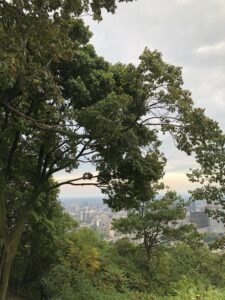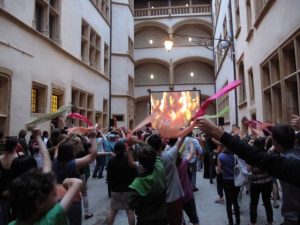Posts Tagged ‘movies’
Fragments of a Whole Being Belonging
I belong to Air Canada.
In this moment. January 2020.
Buckled into Seat 14C.
Far above where birds take flight. The place where dreams alone can live.
In this moment, I belong to this unbounded world above the clouds. A creature of the air.
This air-borne liberation is a mirage.
I know my feet belong on the ground. A creature of the earth.
I am on a flight to Montreal to visit friends. Their relocation to this city will bring me back again and again because our friendship is long standing and we will nurture it. My friends have also made me belong to Montreal again.

Again, because this is the city where my parents met. Where I was born, but never lived in for long. What part of me, then, belongs here? Belongs to this city where I speak the language only to a moderate level of fluency? Because all of me would not be if it weren’t for this city.
But countries and cities pull at me from all different directions.
Jamaica – my mother’s birthplace. Lebanon – my father’s. Kuwait – where my sister was born. Calgary – where my youngest sister was born. And Vancouver where we settled in 1974 and where my family has stayed since. All of us have ventured afar over the years, whether alone or together, to travel or to live for fragments of time. Toronto – where I lived for six years.
My whole being is a mosaic of spaces, places, and time. Of different cultures and societies. I identify with all of them and I identify with none of them. I am rooted in my experiences with each and am unrooted because I do not feel like I wholly belong in any of them.
They have all shaped me as have other cities I’ve visited, especially those that feel as if they are the locations where I ought to be, where I yearn to be.
In Montreal, my friends and I go to a movie they want to share with me. Their second viewing, my first.
Antigone (in French, Canada, 2019). Sophie Deraspe’s screenplay and her direction. Based on the Ancient Greek play by Sophocles. A play I know. A play that belongs to me because I have studied it, absorbed it, discussed it, taught it, remember it.
This film, this Antigone, which now belongs to me, too, tells the story of an immigrant family to Canada. Two girls, two boys, and a Grandmother, haunted by the memories of the children’s parents murdered in Algeria, in the country that they once belonged to.
In this country, this foreign Canada, do they belong?

Ismène, the older girl, has built a successful career as a hair stylist. The grandmother cooks, cleans, loves each child ferociously. Antigone is fearlessly devoted to the family, to their story, to their truth. In an address to her class, “une exposition,” she elevates her classmates from a state of boredom, heads on the desk, eyes rolling, to whip-straight postures, eyes that pierce through teenage school inertia. Her story of survival, loss, and grief lures them to listen.
Antigone’s two brothers? Étéocle and Polynice? The fierce family love envelops the two brothers and yet they search for belonging elsewhere.
Why isn’t their family enough?
And why do men so often find belonging in violence, especially vulnerable men?
The story of this dislocated, relocated family unravels in flashbacks and in real time. Antigone’s knowledge of her brothers, the appearance of their being and belonging, is contradicted by the reality she grasps in hindsight.
She remembers a night. Polynice creeps home late, after dark. He opens the fridge door, she startles him in the kitchen. He stands in the shadows, the pale light casting an eerie halo around him. Bruised, bloodied, black-eyed, he exults to his sister “I’m in,” “I’m in.”
In what? In toxic brotherhood? In a position to provide for his family now? In hopelessness? In power? In control, as illusory as that power and control may be?
Polynice is not a lone wolf. What he decides matters. It affects him, his brother, his sisters, his grandmother, his community. But he makes choices as if he were alone. Is his choice a resistance to belonging to this family or is it his way to belong more meaningfully?
His choice is made as if he were an island. But no person is an island.
As much as we may long for separation, for isolation. Long to escape duties, obligations, chores, stress, news, disasters, worries, fears. But a hermetic existence is possible for only a few, it is life’s answer or life’s purpose for even fewer.
Most of us, the vast majority, need – crave – connection. We are social creatures. Socialized creatures. We achieve our potential by being a part of a world wide web and I do not mean losing ourselves in the emptiness of cyberspace or discarding hours of our life on the internet.
We want to belong. We are part of a world of belonging.
We recognize that we are as others are. Lost, found, lonely, together, alive, dying, needy, giving, angry, happy, sad, joyful, cruel, kind, hateful, loving, powerful, powerless, smart, stupid, healthy, sick, caring, selfish, playful, serious, studious, ignorant, ambitious, lackadaisical, safe, unsafe, privileged, oppressed, worried, carefree, careful, careless, faithful, faithless, believing, unbelieving. Free, not free.
Isolation, being alone, is a desire, a fantasy, as is belonging. The former is a choice, the latter inescapable. We are compelled into connection. We are born into a web of connections.
We have to negotiate with ourselves as much as with others. We negotiate with life, with experiences. And despite this we are often unprepared for what life throws at us.
Perhaps there is a toxic underpinning to the idea of belonging. After all, embedded in the word “belong” is the idea of ownership. My husband, my wife, my spouse, my daughter, my son, my child, my father, my mother, my parents, my sister, my brother, my siblings, my niece, my nephew, my uncle, my aunt, my grandparents, my cousins, my relatives, my friend, my colleague, my acquaintance, my pet, my community, my neighbourhood, my job, my school, my work, my career, my money, my dreams, my aspirations, my humour, my loss, my grief, my beliefs, my body, my pain.
Would we be better served by leaving belonging to refer to objects? When we talk about humans, living creatures, plants, trees, the earth and the webs of existence in which we’re enmeshed, would it be better use other verbs: “connect,” “embrace,” “cherish,” “know,” “love”? I connect with this city; this city connects with me. This family embraces me; I embrace this family. These friends cherish me; I cherish these friends. I know that person; that person knows me. You love me; I love you.

Words alone will not remake belonging. We need to excavate the purpose, the meaning, the appeal, the allure, the temptation of belonging.
Why do we care about belonging? Why do we need to belong?
Where do we belong? To whom do we belong?
Where do I belong? To whom do I belong? Who belongs with me, to me?
I think we can only remake belonging if we learn to transcend the boundaries of belonging and not belonging. To embrace the ambiguity and uncertainty of embodying different states and ways of being. To be unbounded. To imagine our lives as bigger than what we can see, hear, touch, taste, and smell. Bigger than our dreams, bigger than our imaginations.
Bigger than our communities of “same as me.”
As big as our hearts.
Because we belong nowhere and everywhere.
I belong nowhere and everywhere.
I may live in Vancouver, but fragments of me are dispersed. Unless I identify with everywhere, I can’t care about the world, the environment, the fragile state of humanity’s existence.
We belong to nothing and everything.
I belong to nothing and everything.
Because I am not beholden or enthralled by a particular thing or person and yet I am curious about all the world has to offer.
We belong to no one and everyone.
I belong to no one and everyone.
Because I am not an object to be owned and yet I am human as you are human, as he is human, as she is human, as they are human, as the many are human.
This heart belongs to those I love, but not as a thing for them to own.
It is a gift that says they are valued and valuable.
This soul is untethered in a state of un-belonging.
The essence of me is free.
A Song And Its Resonance
There is this song.
I have listened to it obsessively. Usually at night before I turn off the lights. As a remedy, as a tonic, as an anthem for the work I’m doing and the work I hope to do.
I’ve written about music and memory before (see here), but this is different. This is about now and the way this music spurs me on in the current social and political climate.
This song is a spark. A spark that is a component of the antidote we need in these dark times of hate, intolerance, and evil.
It’s from a movie I’ve never watched and perhaps there’s a risk in viewing only one four-minute segment from a feature-length film. This video is also now almost a year old. I only discovered it because of YouTube’s algorithmic operation. The same algorithms that have contributed to so much of the strife and misinformation that contaminate our news and information diets.
The song is from the movie The Greatest Showman. “This Is Me” is sung by Keala Settle who plays Lettie Lutz in the movie (Annie Jones in real life), the Bearded Lady and one of P. T. Barnum’s original nineteenth century cast members. Leaving aside the nature of Barnum’s commercial project and even the commercial project from which this song is drawn, absorb the lyrics as you watch the video.
As much as the words move me, there is magic in the choreography. It’s that magic that pulls me in — every time. That resonates in my heart. The earthiness of the stamping feet, the power of the arms punched into the air, the rhythmic staccato of the bodies swaying. It’s solid, it’s demanding, it’s asserting the right of these bodies to exist as they are in all spaces. In the light, not the dark, in amongst you and me. In amongst us all.
There’s that moment when the performers are suspended in air. They’ve transcended the chains of exclusion and the labels of derision to float above their cares and their worries, but the truth is in the thud of their landing. That landing on two feet. That is when they reclaim their place. The true power of their existence is in the human groundedness of their experience.
And as much as I appreciate the beauty of the production values in this video, the version of the song that I treasure is this one.
Here, Keala Settle is not singing the song from the character’s perspective. As authentically as she might inhabit the character in the film, she is not Lettie Lutz. That is the masquerade.
In the workshop version, Settle embodies the song. She embodies the essence of the words, the heart of the matter. Here, she is singing her life story. She is reliving every struggle, every hurt, every joy, every triumph, and every hope. It’s that uncloaked look into who she is, who she is without adornment or disguise, that opens up the whole performance, hers and that of every other person in the room. You can see it in the ecstatic communion of their spirits and voices.
And the universality in the message of this song, the truth of it, is that we are all different. Our differences do not make us less than any other. They only do so when others associate difference with inferiority, with lack, with less-than.
Unfortunately, it is also a truth that those with power and privilege have gained their rank through a long historical process of magnifying and demonizing difference. Manipulating fear to validate sacrificing others for profit and prestige. For control.
So, there’s a radical — if not revolutionary — message in this song despite the fact that it’s embedded in a cultural artefact that itself is a product of our systems and structures of consumerism and privilege.
And it is this.
I know that there’s a place for us
For we are glorious
Each and every one of us.
And don’t let them, those who benefit from the exploitation of difference, ever tell you differently.
If they do, fight back.
Do not give them a platform to amplify and broadcast hateful messages.
Vote them out.
Unnecessary Movie Audience Restrictions
Hieronymus Bosch. A late-Medieval Dutch painter and an artist whose work intrigues my son.
This month the Vancouver International Film Festival Society (VIFF) is screening a movie about curators preparing an upcoming exhibition of Bosch’s work. How interesting! How cultural! How … wait a minute: what do you mean I can’t take my son to see the film?
It turns out that if a film is unclassified, the regulations prohibit the sale of a ticket to anyone under 19. How absurd! Furthermore, when a film is classified and those under 19 are able to attend, the VIFF theatre concession can no longer serve its adult patrons alcohol. How ridiculous!
So, I’ve written a letter to Minister Oakes urging her to cut this red tape and I will mail it this evening.
If you share my point of view on this, please write the Minister, too.
The more she hears from BC voters, the more likely the government will address these anachronistic provisions, which make a mockery of consumer protection.
September 2, 2016
Honourable Coralee Oakes
Minister of Small Business, Red Tape Reduction
& Responsible for the Liquor Distribution Branch
P.O.Box 9054, STN Prov Govt
Victoria, BC V8W9E2
Dear Minister Oakes,
I had wanted to buy tickets for my family to one of the Vancouver International Film Festival Society (VIFF) screenings of a movie about Hieronymus Bosch, the visionary late-Medieval Dutch painter.
Unfortunately, I’m unable to do so since the movie is unclassified and I cannot buy a ticket for my fifteen year-old son.
My son is an artist and has long been intrigued by Bosch’s work. As his parent, I’m very comfortable in accompanying him to this movie. Its content is cultural, informative, historical, and fascinating. It is in no way a threat to his well-being or his psyche. I think anyone would be hard-pressed to argue that he doesn’t have the maturity necessary to watch this particular film.
In inquiring as to why I was unable to take my son to the movie, I have learned that it is provincial law, not VIFF policy, which demands the classification of films before they can be shown to teenagers. Apparently this law covers only theatrical screenings and DVD releases, but not television nor the internet.
This regulatory policy is based on a logical fallacy that an unclassified film is the same as an unsuitable one. It is a level of red tape that not only hinders operations at VIFF, one of Vancouver’s outstanding cultural institutions, but it also assumes that parents are incapable of determining which movies their teenage children may watch.
The same anachronistic regulations prohibit VIFF from allowing liquor in the theatre on Seymour Street when youth under 19 are present. This seems like an unnecessary duplication of restrictions given that concession staff would be prohibited from serving minors. It also diminishes the experience for older patrons who are denied their full privileges simply because the broader classification of a particular movie expands the audience for that particular screening.
I am writing to ask that you review these particular regulations and amend them at the earliest opportunity. Allow teenagers to attend unclassified movies with their parents’ approval and allow liquor service when a movie audience includes those under 19. That would be an effective red tape reduction and a positive support for small business in the cultural sector.
Thank you Minister Oakes for your consideration of the above. I hope that you will take the measures necessary to introduce a more enlightened approach for screenings of unclassified films in Vancouver, whether at the VIFF theatre or at other locations. Such an approach would facilitate the attendance of teens at film events. It is an approach that will draw in younger audiences, not shut them out and without diminishing the experience of older patrons.
Sincerely yours,
Reema Faris
cc.
Honourable Suzanne Anton, Attorney General & Minister of Justice
Jacqueline Dupuis, Executive Director, VIFF Society
Rob Gialloreto, President & CEO, Consumer Protection BC
Friends, Movies, and Memories
I had lunch with friends recently. Our conversation turned to favourite movies and I mentioned Truly, Madly, Deeply starring Juliet Stevenson and Alan Rickman. I also said how tough it was to track down a copy to play at home. The DVD had been discontinued and anything I’d found online was expensive.
Later that day I received an email from my friend: she’d ordered a copy of the movie for me. She didn’t realize it at the time, but the copy she’d tracked down was reasonably priced because it was a VHS tape. Not a problem: I have a working VCR at home.
I first saw Truly, Madly, Deeply when I lived in Toronto (1986-1992). There were any number of cinemas within walking distance of where I lived and a quick subway ride could get me to movie theatres on St. Clair or further north along the Yonge Street corridor.
I went to the movies often during this time and often alone.
Why?

Because when you live on your own, you learn to take yourself out. You can’t always count on having someone there to go with you, whether to a movie or for dinner or to special events. It’s tough to do, especially as a woman, but it’s key to surviving the isolation and loneliness of city life.
I remember enjoying many new releases in Toronto including Disney’s Beauty and the Beast. I was much older than the target demographic but was enticed by the reviews which described Belle as a new-style Disney heroine. She reads!
I saw Thelma and Louise in Toronto although I’m not sure the stranger who sat beside me understood the film given how his hand drifted over during the screening to fondle my thigh.
There were also movies I enjoyed with friends or with visiting family members. Dirty Dancing, Dances with Wolves, Terminator 2 (at the time, the most expensive movie ever made). I also remember going to see Silence of the Lambs (it made me nauseous) and The Princess Bride which had me laughing as much as I’d ever laughed.
Those memories may not be as vivid as they once were, but the stories, the images, the feelings, the impact of that time and those movies have stayed with me.
So as I anticipate the click of the VHS tape in the machine and the whirl of the spools as the tape begins to play, I’m also a little nervous. Will the movie live up to my remembrance of it? Will it move me in the same way as before? Will I go through piles of tissues the way I did when I first saw it?
At the end of the day, it doesn’t matter. I’ll enjoy the film, but the memory I’ll latch on to is that of a friend who went out of her way to help me recapture the magic of a darkened theatre and a brilliantly acted story of love, grief, healing, and life.
Thank you A.E.!
An excerpt from La Muerta (The Dead Woman), a poem by Pablo Neruda, which is recited in Truly, Madly, Deeply
No, forgive me.
If you no longer live,
if you, beloved, my love,
if you have died,
all the leaves will fall in my breast,
it will rain on my soul night and day,
the snow will burn my heart,
I shall walk with frost and fire and death and snow,
my feet will want to walk to where you are sleeping, but
I shall stay alive …
